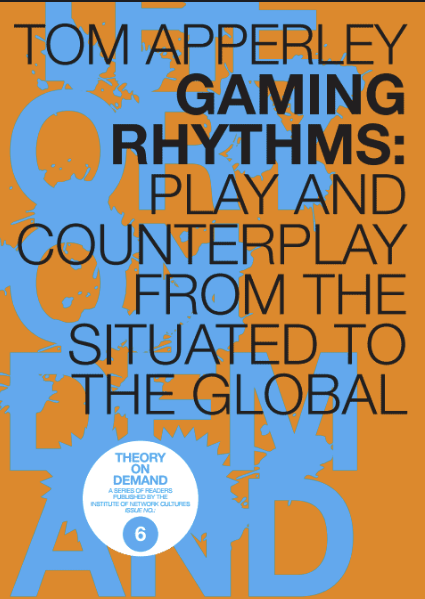Gaming Rhythms: Play and Counterplay from the Situated to the Global
Editorial: Institute of Network Cultures
Licencia: Creative Commons (by-nd)
Autor(es): Apperley, Thomas
The word 'digital games' evokes an immense repertoire of possibilities. It is difficult to provide an exhaustive list of the hardware, the software, the people who play them and the spaces where they are played. Beyond this, there is a vast amount of materials that are ancillary to actual play— in the form of after action reports, FAQs, guides, walkthroughs, and wikis (to name a few).
Digital games are ubiquitous, promoted as a technology for the whole family by wholesome stars like America Ferrara, Nicole Kidman, and Beyoncé Knowles. Negative accounts also abound; every time there is a school massacre journalists race to pin the crime on one game or another. The mainstream press and media industries have a rather two-dimensional approach to digital games: horror stories about addiction, isolation, obesity, and violence; or excitement over the latest innovation Blu-ray, iPod apps, Project Natal, and such. An audience does exist who are willing to understand gaming in a more ‘culturally’ sophisticated way, demonstrated by examples such as the Canadian cult television series JPod—based on the novel by Douglas Copeland—and the cult ‘stoner’ film Grandma’s Boy produced by Adam Sandler, which both parody the banality of labor in the digital games industry.
Although usually digital games are not dealt with sophisticatedly, for example Reign Over Me uses the digital game Shadow of the Colossus as a metaphor for isolation felt by the main protagonist. Prone to locking himself away for marathon gaming sessions in order to block out the grief over losing his family, we know that when at the end of the film Charlie Fineman (Adam Sandler) starts playing the game with others that he finally is recovering. But despite the growing preeminence of digital games in the media—and in culture more generally— there remains a sense of unease. Beneath the hype about the latest game technology are concerns: what are digital games are doing to us (or even worse to the children)? A concern that this book will argue should be supplemented by: what are people doing to—and with—digital games?
This book is about digital games, the people who play digital games, and how they play them.
[Amsterdam:2010]
Compartir:
Una vez que el usuario haya visto al menos un documento, este fragmento será visible.


